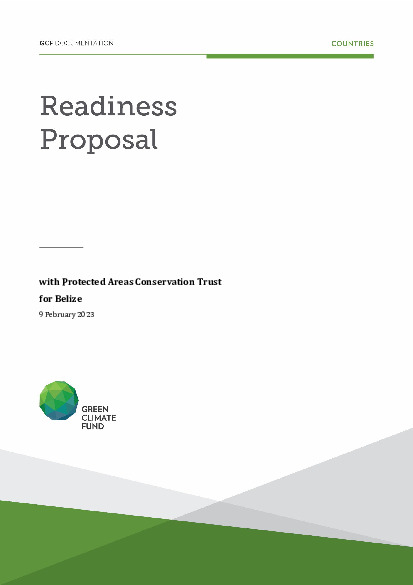Enabling Activities for the Formulation and Implementation of a Multisectoral National Adaptation Plan for Belize

Enabling Activities for the Formulation and Implementation of a Multisectoral National Adaptation Plan for Belize
Belize is Party to the United Nations Framework Convention on Climate Change (UNFCCC) and the Paris Agreement. Article 7.9 of the latter requires Belize to, “as appropriate, engage in adaptation planning processes and the implementation of actions, including the development or enhancement of relevant plans, policies and/or contributions” including the formulation of national adaptation plans. National planning, for both adaptation and mitigation, has been pinned as a key mechanism for addressing climate impacts and vulnerabilities in country. At the national level, Belize’s Nationally Determined Contributions (NDC) and National Climate Change Policy, Strategy and Action Plan (NCCPSAP) further highlight the importance of capacity building for adaptation planning, as well as aligning administrative and legislative mechanisms with the country’s efforts for adaptation planning.
Although Belize has a strong commitment to combating the impacts of climate change and challenges that arise, as a nation Belize lacks the extensive technical and financial resources required to meet obligations under the Paris Agreement and UNFCCC. However, the Government of Belize (GOB) is committed to taking all necessary and feasible actions at the national and international levels to meet the stipulations of the Treaty and Convention. Therefore, the proposed Green Climate Fund (GCF) Readiness Support will contribute to Belize meeting international requirements and national targets of the NDC and NCCPSMP, by enabling the country to strategically address climate change adaptation via capacity development, knowledge transfer, and improved adaptation planning. This will be achieved by receiving support for the formulation and implementation of a multisectoral National Adaptation Plan (NAP), which will guide the future development of the country’s major sectors under changing climatic conditions, inclusive of the following priority sectors: i) Land Use, Human Settlement & Infrastructure (243,759 – population living with 25 km of coastline), ii) Tourism (20,020 – average between 2019 & 2021), iii) Human Health (6,244 - average between 2019 & 2021), iv) Agriculture (25,906 – average between 2019 & 2021), v) Forestry (10,201 - average between 2019 & 2021)1. The multisectoral approach will stem from the creation of synergies and linkages between the different sectors being considered under these NAPs and those on the pipeline. Cross linkages between specific sectors will be enhanced to build resilience to climate changes and support vulnerable populations. Of significant importance is the linkage between forest, land use and agriculture, as these sectors have a direct impact on the economy, but are vital in climate change adaptation and building resilience.
Adaptative planning to the impacts of climate change requires an enabling environment, to allow for the implementation of the necessary actions to be effective. Coupled with available resources for implementation, multisectoral adaptive planning can increase resilience to climate change of the most vulnerable populations. Belize, as a Small Island Developing State (SIDS), has an economy that is depended on its natural resources and Gross Domestic Product (GDP) that is often on a deficit. The current economic scenario for Belize, coupled with high dept, limits the public sector investments that can be used to address climate change. Another limiting factor is the limited human resources to plan and implement climate actions and interventions. This NAPs Readiness will address these barriers from a multisectoral approach, it will develop and implement capacity development materials to enhance the adaptive capacity of the human resources, coupled with strategic communication outreach and knowledge transfer. The identification of sector-based climate hazards, vulnerabilities and risks will be associated with adaptive solutions that ensure that the needs of all vulnerable groups are considered. Finally, the adaptation solutions will be linked to appropriate climate financing strategies, for which three concept notes will be developed for submission to the GCF for financing consideration.
The NAP will take into consideration the needs of women, youths, men, vulnerable people as well as local and indigenous communities. Through the validation, trainings, consultations and workshops, this Readiness will engage 3,360 direct beneficiaries and indirectly benefit around 240,000 from the combined priority sectors this Readiness is focusing on. The GCF Readiness Support will also enable Belize to increase adaptive capacity at the community and technical level, by creating the enabling environment and setting the foundation for multisectoral adaptative action in Belize. The proposal will guide climate financing through the development of concept notes for prioritized adaptation actions to benefit the entire population and the economy of Belize. The formulation and implementation of the NAP will enable Belize to formulate concrete interlinked solutions, adaptation actions in the priority sectors and will support strengthening existing mechanisms and adaptation responses at a multisectoral level.